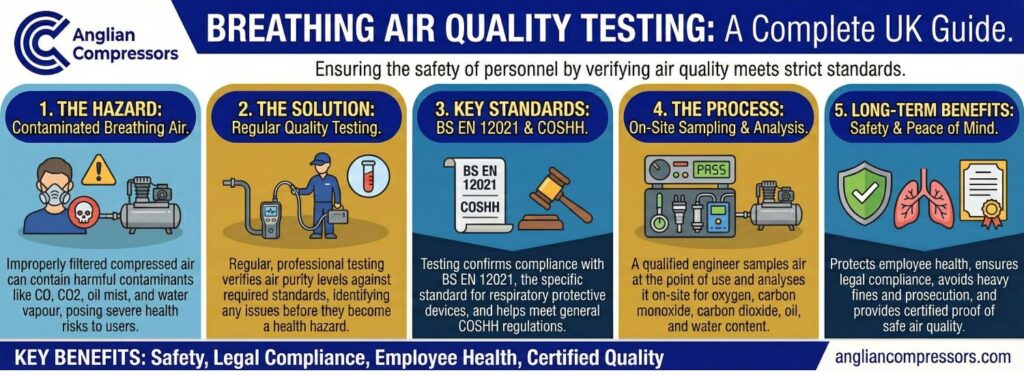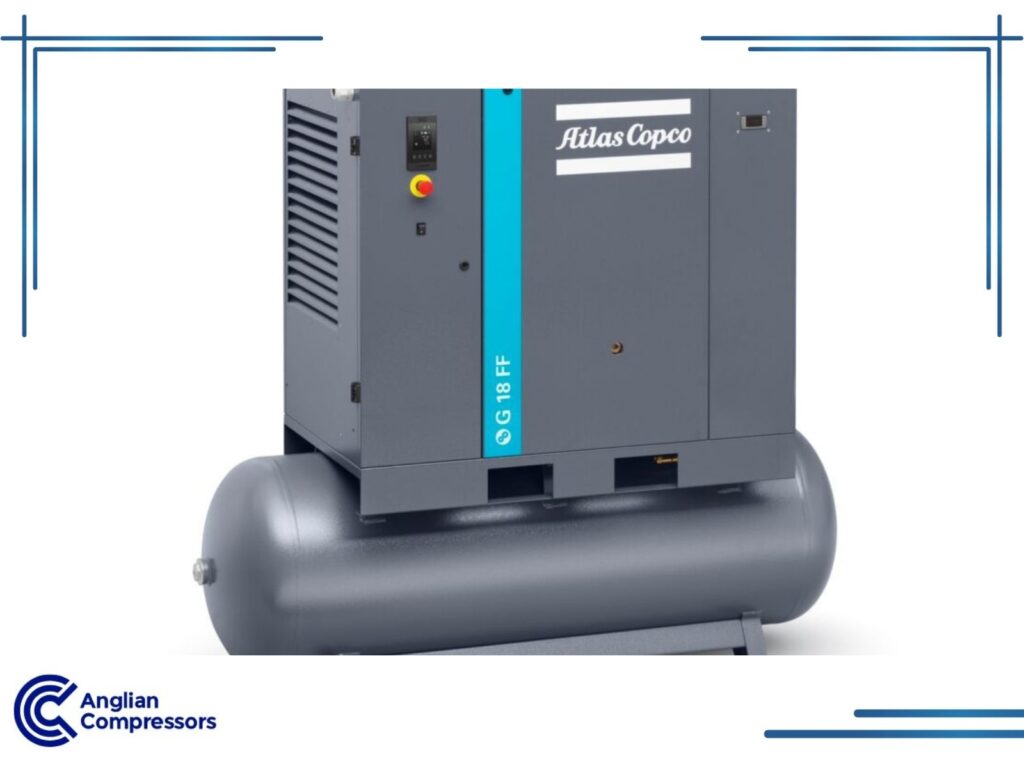Compressor Air Quality Testing
Air quality is an important aspect of UK employee health that employers are legally required to manage properly via compressed air regulations. This applies whether the staff are working indoors or as part of a mobile unit providing services outdoors, or at a secondary location.
Compressed air regulations should align with ISO 8573 standards, which categorise air quality based on particulate matter, water content, and oil content. Following these standards is essential for industries to meet both operational and legal requirements.
Poor air quality has far-reaching consequences. It can damage expensive equipment, contaminate products, and even pose health risks to workers. These issues can lead to costly repairs, production delays, product recalls, and potential legal liabilities. By proactively air testing and maintaining compressed air quality, you can safeguard your operations, protect your employees, and ensure the longevity of your valuable equipment.
This guide will delve into the importance of compressed air quality testing, explore the different types of contaminants that can affect your system, and outline the best practices for ensuring your compressed air is clean, dry, and safe. Whether you’re a seasoned professional or new to the world of compressed air, understanding the ins and outs of air quality testing is essential for maintaining a productive and efficient operation.
Compressed Air Quality Testing: Safer and Cheaper Workspace
Ignoring compressed air quality testing might seem like a cost-saving measure in the short term, but it can lead to significant financial and legal repercussions down the line. Here’s how investing in regular testing ultimately creates a safer and more cost-effective workspace:
Protecting Your Bottom Line
Preventing Equipment Breakdowns: Contaminants like dust, oil, and water vapour are notorious for wreaking havoc on compressed air systems. They cause increased wear and tear, leading to premature component failures, costly repairs, and unplanned downtime – all of which impact your productivity and bottom line. The inclusion of high-performance filters, such as Atlas Copco’s line filters, can reduce contaminant risks effectively.
Minimising Downtime: When a critical piece of equipment goes down due to air quality issues, your entire operation can grind to a halt. Production delays, missed deadlines, and unhappy customers all translate into lost revenue. Regular testing helps you stay ahead of these issues, ensuring smooth and continuous operations.
Reducing Energy Costs: A contaminated compressed air system has to work harder, leading to increased energy consumption and higher utility bills. By keeping your system clean and running efficiently, you’ll consume less energy and save money in the long run. For example, integrating variable speed drive (VSD) technology optimises energy usage, as seen in Atlas Copco’s compressors.
Protecting Your People
Legal Compliance: As an employer in the UK, you have a legal responsibility to provide a safe working environment. This includes ensuring the air quality meets stipulated standards, particularly for employees using breathing apparatus. Regular testing keeps you compliant and avoids potentially hefty fines.
Healthier Workforce: Poor air quality can lead to a range of health issues for your employees, including respiratory problems, skin irritations, and allergies. By prioritising air quality, you’re investing in the well-being of your workforce, leading to increased productivity and a more positive work environment.
Beyond the Obvious:
Product Quality: In industries like food processing and pharmaceuticals, even slight contamination can ruin entire batches of products, leading to costly recalls and damage to your brand reputation. Regular testing helps you maintain the highest standards of product integrity.
Environmental Responsibility: By ensuring your compressed air system runs efficiently, you’re also minimising your environmental footprint. Reduced energy consumption means fewer greenhouse gas emissions.
Investing in regular compressed air quality testing is not just about ticking boxes – it’s a smart business decision that protects your employees, your equipment, and your bottom line.

Examples of Compressed Air Contaminants
There are different kinds of compressed air contaminants and each type affects your equipment differently. These are some of the most common compressed air contaminants that can wreak havoc on your systems and pose risks to your workforce:
- Solid Particulates: Think of these as microscopic bits of debris—dust, rust, pollen, even tiny pieces of metal from worn-down components. These particles can travel through your compressed air system and cause abrasive wear on equipment, leading to leaks, reduced efficiency, and premature failures.
- Oil: Compressor lubricants are essential for smooth operation, but they can also become a contaminant if they’re not properly managed. Oil can be present as aerosols (tiny droplets) or vapours. In either form, it can contaminate sensitive products, especially in industries like food processing, pharmaceuticals, and electronics.
- Water Vapour: Humidity is a natural part of the air we breathe, but in compressed air systems, excess moisture spells trouble. Water vapour contributes to corrosion in pipes and equipment, weakening their integrity and potentially leading to leaks or structural failures.
- Microbial Contaminants: Where there’s moisture, there’s often life—unfortunately, that includes microbes like bacteria and fungi. Microbial contamination poses significant risks to product sterility and can lead to product recalls, particularly in industries with stringent hygiene requirements.
Understanding these common contaminants and their potential impacts, lets you make informed decisions about testing, filtration, and maintenance for your business.
What Industries Are Most Applicable for Compressed Air Testing?
Compressed air testing is essential across many industries where air quality directly impacts safety, product integrity, and compliance with standards like ISO 8573.
Food and Beverage
Testing compressed air ensures its purity, preventing contamination that could affect product quality and lead to costly recalls. It also ensures compliance with strict air quality standards, safeguarding consumer health.
Pharmaceuticals
Pharmaceuticals require ultra-pure compressed air. Regular testing is crucial to ensuring the air meets the necessary standards to maintain sterile conditions, protecting both product integrity and patient safety.
Electronics Manufacturing
Microscopic contaminants can cause defects in electronic components. Regular air quality testing helps maintain high purity levels, ensuring the reliability and longevity of electronic products.
Automotive and Aerospace
In these industries, testing compressed air minimises contamination during processes such as painting and assembly, which is vital for maintaining quality and preventing production defects.
Chemical Manufacturing
Clean air is critical in chemical production. Compressed air testing ensures the air meets the necessary quality standards, preventing product inconsistencies and reducing the risk of safety hazards.
Healthcare
Compressed air is vital in healthcare applications such as respiratory protective equipment and surgical tools. Regular testing ensures compliance with stringent breathing air standards, ensuring both patient and staff safety.
Air Quality Safety Regulations for UK Workplaces
UK employers must provide safe working environments, including properly managing compressed air systems used for breathing. ISO 8573 standards outline specific purity requirements for particulates, water, and oil content in compressed air. Regular testing ensures compliance with BS EN 12021 when air is used for breathing.
The law requires keeping contaminants as low as possible, below maximum permitted limits. For breathing air, strict limits apply to carbon monoxide, carbon dioxide and oxygen levels. Proper oxygen content is vital – too little can cause hypoxia. If dryers malfunction, oxygen levels may drop, or moisture can build up, potentially causing condensation or freezing that blocks air supply.
Testing should occur at least every three months or more if conditions change. Tests must be conducted at the air source and where it is used. This provides an accurate picture of the air quality workers receive. Employers must maintain clean, consistent air quality through regular checks using appropriate testing equipment.
Many companies now use monitoring systems like Atlas Copco’s SMARTLINK to track compliance and meet inspection requirements. These systems create reliable records for audits and help with certification under various standards.
Food processing, healthcare, and manufacturing businesses must follow UK regulations to protect workers and maintain product quality. Non-compliance can result in fines, operational shutdowns, damage to reputation and health risks for employees.
Problems often arise from simple maintenance issues like forgotten filter changes, improper equipment installation or neglecting quarterly tests. Local testing firms typically charge between £200 and £350 for a standard air quality assessment. Most issues can be resolved quickly once identified.
Why is Air Quality Testing So Important?
Most industries are legally required to meet certain ISO 8573 classes. Failure to comply can result in fines, legal action, or even the shutdown of your operations. Especially when compressed air is used for breathing air systems, meeting the required ISO class is crucial for safeguarding the health of your employees.
Failing to meet compressed air quality regulations will bring consequences like:
- Financial Penalties: Regulatory bodies have the power to issue hefty fines for non-compliance.
- Reputational Damage: News of safety violations or product recalls due to air quality issues can severely damage your brand reputation and customer trust.
- Legal Action: In cases of employee illness or product liability claims linked to poor air quality, your business could face costly lawsuits.
Testing should be conducted every quarter, or sooner still, based on need. Respiratory equipment, that relies on high compressed air quality to be safe and effective, must be considered on its merits.
For example, in less clean environments, monthly testing might be more relevant. Advisories indicate when equipment is relocated either to another area within the work environment, or to a secondary location, retesting of air quality is necessary to ascertain whether the same conditions are relevant or not.
Also, in mobile environments where equipment is regularly moved around, this calls for retesting at each deployment to ensure safe exposure levels are maintained for employees.
Testing Methods for Compressed Air Quality
Testing compressed air helps ensure it meets ISO 8573 and BS EN 12021 standards, particularly when it is used in manufacturing or for breathing apparatuses.
Particulate Testing
Solid contaminants, such as dust and metal fragments, are checked using filter test tubes or laser particle counters. Most UK workshops test quarterly, though food production facilities often test monthly. A typical counter costs around £1,200, but many firms rent equipment as needed.
Dew Point Measurement
Moisture in the air can cause condensation, leading to rust and equipment problems. Dew point sensors check moisture levels to confirm dryers work properly. Many UK sites struggle with older dryers that need frequent maintenance, especially during damp winter months.
Oil Content Testing
Oil vapour is measured using chemical tubes or gas chromatography. A Birmingham manufacturer recently found their distribution pipes were contaminated despite having clean air at the source, which highlights why testing at multiple points matters.
Microbial Testing
Air is tested for bacteria and fungi in healthcare and food production using collection plates. Labs typically need 48–72 hours to process these samples, which costs about £85 to £120 per test in most parts of Britain.
Breathing Air Testing
For breathing apparatus, tests examine oxygen levels, carbon monoxide, carbon dioxide and oil content. By law, fire brigades and diving centres must conduct these tests every three months, with records kept for at least five years.
Testing should occur quarterly at minimum, with more frequent checks for portable systems. Always test where the air is used, not just at the compressor. The HSE guidelines suggest maintaining a logbook of all tests, including failed ones – something many smaller workshops overlook.
Choosing the Right Equipment and Maintenance Practices
Once you know the state of your compressed air quality, you can select the appropriate equipment and establish a robust maintenance plan:
- Filtration Systems: Different types of filters are designed to remove specific contaminants. Your choice of filters should be based on the required ISO 8573 purity class and the specific needs of your applications. Atlas Copco’s line and activated carbon filters are highly effective for diverse industries.
- Dryers: Refrigerant dryers and desiccant dryers are commonly used to remove moisture from compressed air, preventing corrosion and microbial growth.
Additionally, routine air quality monitoring tools like SMARTLINK ensure continuous oversight and help avoid potential compliance issues.
Even the best equipment needs regular attention to ensure optimal performance. This includes:
- Replacing filters at recommended intervals or when pressure drop readings indicate clogging.
- Draining condensate from filters, dryers, and air receivers regularly.
- Conducting periodic inspections of the entire system for leaks, wear and tear, and other potential issues.
Compressed Air Quality in Specialized Industries
Certain industries have particularly stringent air quality requirements due to the sensitive nature of their products or processes:
- Food and Beverage: Compressed air used in food production must be free from contaminants that could compromise food safety. In addition to ISO 8573, specific regulations like the FDA guidelines for compressed air in food production must be strictly adhered to. Failure to do so can result in product recalls, regulatory action, and reputational damage. Atlas Copco’s oil-free compressors and FDA-approved filters are ideal for these environments.
- Pharmaceuticals: The pharmaceutical industry demands exceptionally high levels of air purity to prevent contamination of medicines. Air used in the production process must meet or exceed the requirements of both ISO 8573 and other relevant pharmaceutical-grade air standards. Class 0 certified compressors are a must.
- Electronics Manufacturing: Even microscopic particles can cause defects in sensitive electronic components. The electronics industry often requires compressed air with extremely low particle counts, often exceeding the requirements of even the most stringent ISO 8573 classes.
Air quality needs differ by industry, so prioritise fixing any issues you have now.
What Are Workplace Exposure Limits?
Control of Substances Hazardous to Health (COSHH) as part of the HSE is a legal framework that sets forth what employers are required to manage relating to potentially dangerous substances.
COSHH aims to provide processes that are strongly recommended to employers to keep staff from being exposed to unsafe levels of hazardous substances. The maximum acceptable levels for different substances do get updated, either through the UK or from EU laws too.
The regulations created in 2002 — SI 2002/2677 set the workplace exposure limit aka WEL – which was updated subsequently in 2004 as SI 2004/3386.
Furthermore, new exposure limits for 13 substances were added or saw their levels revised in 2020 too. As such, it is an evolving legal requirement to ensure safe air that’s breathable for people using respiratory equipment.
Proper Risk Assessment is Critical
Risk assessment for breathing air systems must, by necessity, be proactive, rather than reactive.
Each workplace setting is unique. Breathing air quality testing is essential to ensure the safety of everyone sharing the same work environment and using RPE. This applies to mobile breathing air compressors just like it does to fixed location equipment.
Anglian Compressors, a Branch of Atlas Copco Compressors, are your trusted partners in compressed air quality management. We offer:
- Comprehensive Testing Services: Our team uses the latest technology and methodologies to accurately assess your compressed air quality, identifying potential issues before they escalate.
- Tailored Solutions: We work with you to develop a customised air treatment plan that meets your specific industry needs and ensures compliance with all relevant regulations.
- Ongoing Support: Our commitment to your peace of mind doesn’t end with testing. We provide ongoing maintenance support, expert advice, and reliable solutions to keep your compressed air system running smoothly and efficiently.

Let Anglian Compressors, a Branch of Atlas Copco Compressors, Help
Using a breathing air purifier and testing the air quality that your employees rely upon is essential.
Anglian Compressors, a Branch of Atlas Copco Compressors, provides the highest level of equipment from Atlas Copco. This includes complex, multi-filtration systems to remove excess carbon, oil, water, CO oxidation, and bacterial organisms to deliver a working environment that meets all necessary air quality regulations and standards required by UK companies.
Contact us below.
FAQ
What are the key differences between oil-free and oil-lubricated air compressors?
Oil-free air compressors use materials such as Teflon for lubrication, whereas oil-lubricated compressors rely on oil to lubricate their internal components. Oil-free compressors provide cleaner air, making them ideal for industries like pharmaceuticals or food processing. On the other hand, oil-lubricated models offer greater durability for heavy-duty applications but require regular oil changes and maintenance.
Are oil-free air compressors better for certain industries?
Yes, oil-free air compressors are often considered more suitable for industries where air purity is critical, such as electronics, food production, and pharmaceuticals. They eliminate the risk of oil contamination in the air stream, ensuring compliance with strict air purity standards.
Do oil-lubricated compressors require more maintenance than oil-free models?
Yes, oil-lubricated compressors typically require more frequent maintenance, including oil changes and filter replacements. Oil-free compressors generally require less maintenance due to the absence of oil in the system, though periodic checks on self-lubricating components like Teflon coatings may still be necessary.
What should be tested in a compressed air system?
Compressed air systems need testing for dust particles, water vapour, oil content, and sometimes bacteria. Oxygen levels, carbon monoxide, and carbon dioxide must also be checked for breathing equipment. Regular testing ensures your system meets UK standards.
Most small workshops focus on particle and moisture tests first, as these cause the most common problems. A Manchester engineering firm recently found that their Monday morning tests showed higher moisture levels than Friday tests due to weekend system pressure changes.
How often should compressed air be tested?
Tests should happen every three months at a minimum. Sites with changing conditions may need more frequent checks. Test both at the compressor and where the air is used – contaminants often enter through old pipework or fittings.
The testing schedule often falls to maintenance teams, who sometimes struggle to fit it between other jobs. Many companies now mark their quarterly tests on workshop calendars to avoid missing them.
What equipment is used for testing?
Common tools include particle counters, dew point meters, oil monitors, and bacterial samplers, ranging from simple handheld devices to more complex analysers.
A typical testing kit costs about £2,500, though many smaller firms hire equipment or use external testing services for about £275 per visit. The meters need annual calibration, which some workshop managers forget to budget for.

